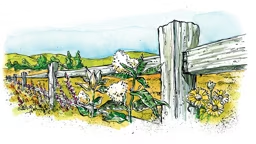– Joyce, Lake Washburn, Minn.
A: Suppressing roadway dust can be a challenge. When determining how to tackle dust, consider your intended level of involvement, the material in your roadway and your budget.
Let’s assume you are tired of hiring a water truck and you do not want to oil your roadway. An option is to use chemicals. Magnesium chloride, calcium chloride and organic binders all work to suppress dust. To varying degrees, these products increase water retention and strengthen the road surface. Bonded soil arrests dust and makes the road more resilient to potholing.
Unless you are handy with mixing ingredients and have a portable tank and spreader bar, or a tractor with a wheeled fertilizer attachment, you'll need to hire a contractor experienced in applying roadway chemicals.
Finding the right contractor, or any contractor, may pose a great challenge. Call your local public works department or extension office, and ask whom they use for applying dust suppressants.
When you talk to a contractor, ask what products he/she uses and research their effectiveness. When dealing with multiple contractors, price may determine which product you use. If you purchase chemicals and hire a contractor to apply them, you stand a better chance of getting the right concentration on the road. But expect to pay contractors a markup on whatever you provide. Do-it-yourselfers can usually find dry flake and concentrated liquid chemical suppressants at the local farm supply or co-op. Ask store personnel what works best in your region and on your soils. Chemical brands vary, as does pricing. Some products are available regionally, whereas others are not.
Also consider soil type. Clay and fine-grained soils are dustier than sandier soils, but they also respond better to chemical treatment. Determine how much road you want to treat. What do your neighbors want? Are they willing to pitch in? It may be smarter to target intersections, or a strip in front of your home, and let the rest go.
If you are not interested in asphalt or concrete paving, consider a cement treatment. Here, cement is tilled 8 to 12 inches into the roadway. It’s then wet and rolled. This controls dust and stabilizes the road. Not all road contractors are familiar with this effective technique.
Surfacing the road with crushed rock, no smaller than ¾-inch, can also help reduce dust. The key words here are "crushed" and "¾ inch." As with most road rocking jobs, some contractors purchase the cheapest material available and overcharge for it. When rocking large segments of roadway, it may pay to hire a consultant to help control what rock gets imported to your project.
Lastly, traffic control is the cheapest way to reduce dust. If you haven’t, post regulation-sized speed limit signs and install speed bumps. Any combination of the above should result in less dust and better living conditions for those who occupy rural roads.
 Twigra
Twigra 






